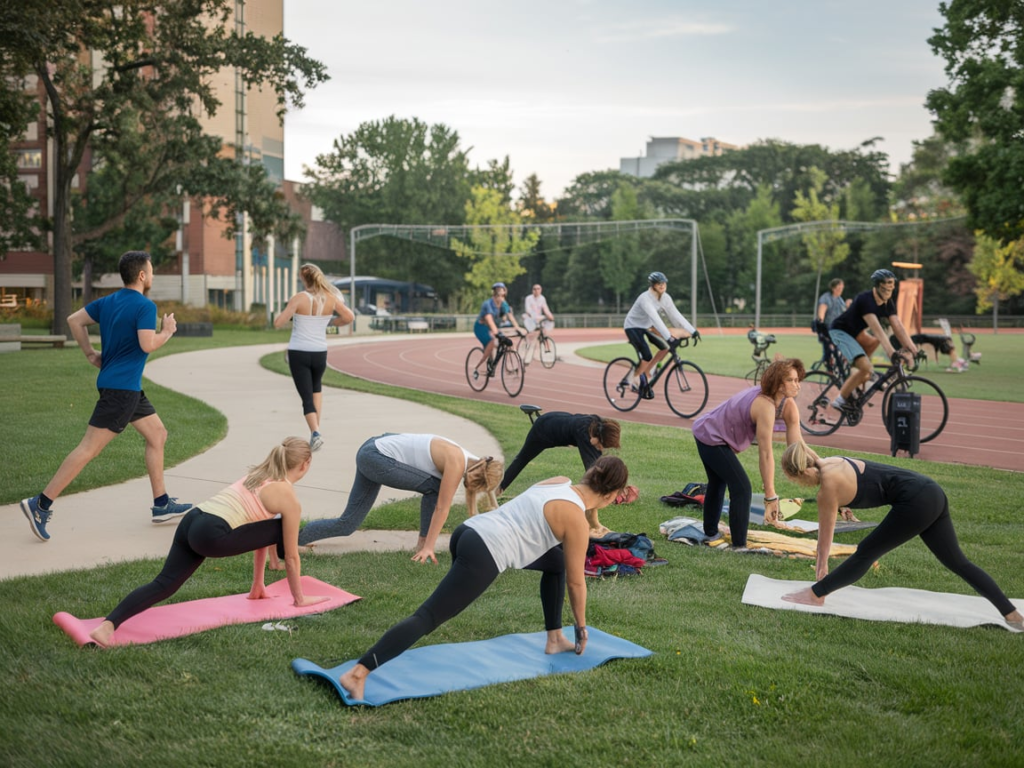
"Unlock the Secrets to a Healthier You! Discover the 7 Key Components of a Lasting Lifestyle."
A healthy lifestyle is not just about diet and exercise; it encompasses a holistic approach to well-being that includes physical, mental, and emotional health. By making informed choices and adopting sustainable habits, you can enhance your quality of life and longevity. In this article, we’ll explore the key components of a healthy lifestyle, practical tips for implementation, and answers to common questions.

1. Understanding the Importance of a Healthy Lifestyle
Living a healthy lifestyle can significantly impact your overall well-being. Benefits include:
- Improved Physical Health: Reduces the risk of chronic diseases such as heart disease, diabetes, and obesity.
- Enhanced Mental Well-Being: Regular exercise and a balanced diet can improve mood and reduce symptoms of anxiety and depression.
- Increased Longevity: Healthy habits can lead to a longer, more fulfilling life.
- Better Sleep Quality: A balanced lifestyle can improve sleep patterns, leading to more restful nights.
2. Key Components of a Healthy Lifestyle

A. Balanced Nutrition
Eating a well-rounded diet is crucial for maintaining energy levels and overall health. Focus on:
- Whole Foods: Incorporate fruits, vegetables, whole grains, lean proteins, and healthy fats. Aim for a colorful plate to ensure a variety of nutrients.
- Hydration: Drink plenty of water throughout the day. Aim for at least 8 glasses (2 liters) daily, adjusting for activity level and climate.
- Moderation: Allow yourself occasional treats without guilt. The key is moderation and balance.
Resource: For more on nutrition, visit ChooseMyPlate.gov.
B. Regular Physical Activity

Exercise is vital for physical health and mental clarity. Recommendations include:
- Aerobic Exercise: Aim for at least 150 minutes of moderate aerobic activity or 75 minutes of vigorous activity each week. Activities can include walking, running, cycling, or swimming.
- Strength Training: Incorporate strength training exercises at least twice a week to build muscle and enhance metabolism.
- Flexibility and Balance: Include activities like yoga or Pilates to improve flexibility and balance, reducing the risk of injury.
Resource: Check out the CDC’s Physical Activity Guidelines.
C. Mental Health and Well-Being

Mental health is as important as physical health. To nurture your mental well-being:
- Mindfulness and Meditation: Practice mindfulness or meditation to reduce stress and enhance focus. Even a few minutes daily can make a difference.
- Social Connections: Maintain strong relationships with family and friends. Social interaction can improve mood and reduce feelings of isolation.
- Professional Help: Don’t hesitate to seek help from a mental health professional if you’re struggling. Therapy and counseling can be incredibly beneficial.
Resource: For mental health resources, visit MentalHealth.gov.
D. Quality Sleep
Sleep is essential for recovery and overall health. Aim for 7-9 hours of quality sleep per night by:
- Establishing a Sleep Routine: Go to bed and wake up at the same time every day, even on weekends.
- Creating a Sleep-Friendly Environment: Keep your bedroom dark, cool, and quiet. Consider using earplugs or an eye mask if necessary.
- Limiting Screen Time: Avoid screens at least an hour before bed to help your body prepare for sleep.
Resource: Learn more about sleep hygiene at the National Sleep Foundation.
3. Practical Tips for Implementing a Healthy Lifestyle
- Set Realistic Goals: Start with small, achievable goals and gradually increase your targets. Celebrate your successes to stay motivated.
- Plan Your Meals: Prepare healthy meals in advance to avoid last-minute unhealthy choices. Meal prepping can save time and ensure you stick to your nutrition goals.
- Stay Active Throughout the Day: Incorporate movement into your daily routine, such as taking the stairs, walking during breaks, or doing short workouts at home.
- Track Your Progress: Use apps or journals to track your nutrition, exercise, and mental well-being. This can help you identify patterns and areas for improvement.
4. FAQs About Healthy Living
Q1: Can I make small changes to improve my lifestyle?
A: Absolutely! Small changes, such as drinking more water or adding a short walk to your day, can lead to significant improvements over time.
Q2: How can I stay motivated to maintain a healthy lifestyle?
A: Find activities you enjoy, set realistic goals, and surround yourself with supportive friends and family. Joining fitness classes or groups can also help keep you accountable.
Q3: What if I have a busy schedule?
A: Prioritize your health by scheduling time for exercise and meal prep. Even short bursts of activity, like a 10-minute walk, can be beneficial.
Q4: Is it too late to start living a healthy lifestyle?
A: It’s never too late to make positive changes. Regardless of your age or current habits, adopting a healthier lifestyle can lead to immediate benefits.
Q5: How can I handle cravings for unhealthy foods?
A: Instead of completely depriving yourself, allow occasional treats in moderation. Focus on healthy alternatives and consider the underlying reasons for your cravings.
Conclusion
Embracing a healthy lifestyle is a rewarding journey that benefits your physical, mental, and emotional well-being. By focusing on balanced nutrition, regular exercise, mental health, and quality sleep, you can create a foundation for lasting health. Remember, small changes lead to significant results—start today and enjoy the journey to a healthier, happier you!





